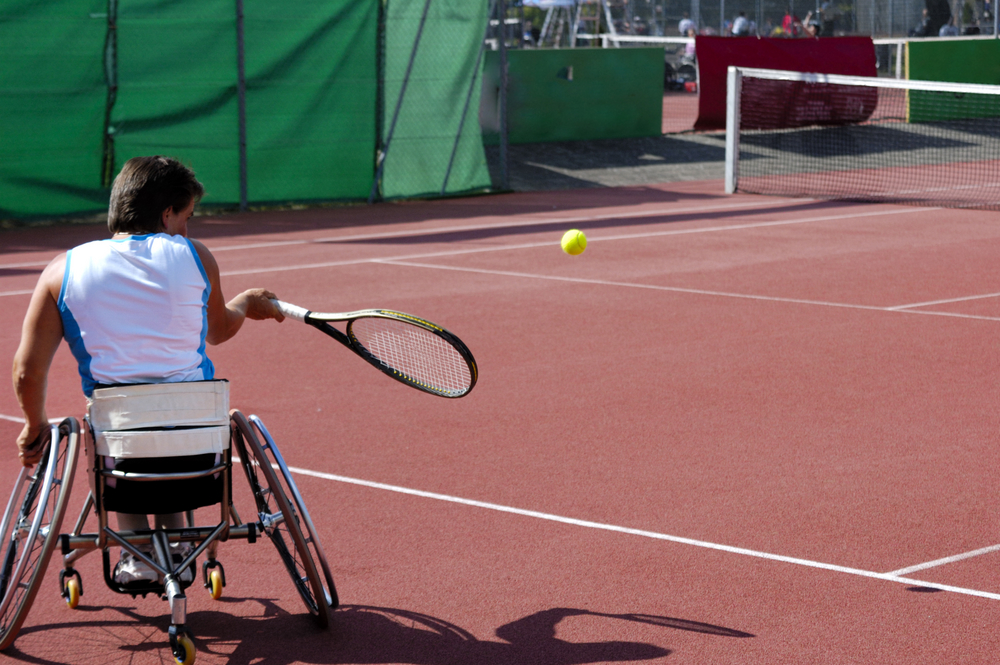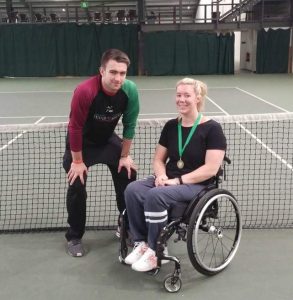Request for Tennis Lessons Leads to Academy Teaching Many Disabled
Written by |

In the summer of 2012 David Bowie’s song “Heroes” became the anthem of the London Olympics despite Bowie turning down an invitation from British director Danny Boyle to be part of the opening ceremony. Gracious as ever, Bowie agreed to a meeting.
Boyle had a lot to thank him for. Bowie had asked Iggy Pop and Lou Reed to let their songs be used basically for free on Boyle’s low-budget 1996 indy film “Trainspotting.” Pop’s (OK — Bowie wrote the music) “Lust for Life,” which for many of us was one of the great songs of the ’70s, became part of a new generation.
In 2012, I’d had MS for three years. I could still walk a fair distance, but thought my days of sport were over.
Tennis had been my game in middle age. I wasn’t that good but had perfected a wicked inside-outside forehand drop shot. I remembered it wistfully because I never thought I’d hit a tennis ball again. Not standing up anyway: I couldn’t risk a fall.
The one fall I’d had that revealed my MS had smashed my shoulder so badly that it took me two operations and three years to recover. In fact, in 2012, it had only just happened. The pain was often so bad that I forgot about MS.
Half-heartedly I’d done a bit of research, but the nearest wheelchair tennis place was miles away. And nobody even picked up the phone.
After the Olympics we had two weeks of the equally successful Paralympics.
The Monday morning after the closing ceremony, my wife asked why there wasn’t disability tennis at our local club. She has a habit of cutting to the chase, and told me to stop whining and do something. She does that a lot.
Luckily our local club, the Sutton Tennis Academy, is a major teaching center. In fact, it was recently featured in the world’s top 50 tennis academies. So in theory it might teach disabled tennis players. And it was just down the road from our house.
My inquiry that afternoon was brushed off. “We used to do it [teaching disabled players] years ago, I think,” the reeptionist said.
“Well, can I have the email address of the manager then?” I asked amiably.
“Sorry. We don’t give information like that out,” she said with finality.
That might have been that — except I felt my old self stirring. Yes, I had MS. Every day was a battle, but I was still me. At this point I hadn’t been a journalist since the days of the electric typewriter, but once I learned, those skills were like riding a bike. OK, I could no longer ride a bike — but you get my point.
The internet makes everything easy. It took me three minutes to find the manager’s email address. Thirty minutes to write a missive and a few more to attach cc’s to the local paper and the Lawn Tennis Association, the UK’s governing body, which sponsors the club. And send.
Four days later I was meeting with the manager. The next week I had my first wheelchair lesson in my day chair. Within a few months, the club had obtained funding, and there were proper sports tennis chairs to practice in.
It still wasn’t easy. For the next year I was invariably on my own. I had to keep going to maintain momentum. That’s what you’re supposed to do in a tennis wheelchair: never, ever stop. Luckily my health held. Fatigue got progressively worse, but I rolled on.
Suddenly there were a lot of players, all much better than me — but then none of them got fatigue. They’d help me in with my tennis equipment. By then I had my own chair, thanks to the Dan Maskell Trust. Any disabled player can apply for a grant.
I’ve heard whispers of people with MS who play wheelie tennis but had never met one or even met anyone who had. Wheelchair tennis is such a small world that I figured I might be the only regular MS player in the UK. Or was until six weeks ago, when a tsunami of health issues hit me, keeping me off court. But I seem to be rallying, and hope to return. (Stop it, you fool!)

Suzanne Edwards and our coach Luke Mulvihill.
A year and a half ago a completely new player to the game hit a forehand that sizzled past me. Yes I have MS, and yes I was equally in a wheelchair, but that had nothing to do with it. The same thing would have happened if I’d been able-bodied. She is good.
The last time I played she was on court: Not surprising, because it seems like she’s going to practically every session. Teaching lessons for he disabled are now occurring nearly every day. Quite the change, hey? I think going pro is already in her sights.
She’s just been ranked 140th in the world and ninth in the UK.
Her name is Suzanne Edwards. I hope she makes it.
MS may restrict us, but we can still make a difference.
***
Note: Multiple Sclerosis News Today is strictly a news and information website about the disease. It does not provide medical advice, diagnosis, or treatment. This content is not intended to be a substitute for professional medical advice, diagnosis, or treatment. Always seek the advice of your physician or other qualified health provider with any questions you may have regarding a medical condition. Never disregard professional medical advice or delay in seeking it because of something you have read on this website. The opinions expressed in this column are not those of Multiple Sclerosis News Today, or its parent company, Bionews Services, and are intended to spark discussion about issues pertaining to multiple sclerosis.



Leave a comment
Fill in the required fields to post. Your email address will not be published.